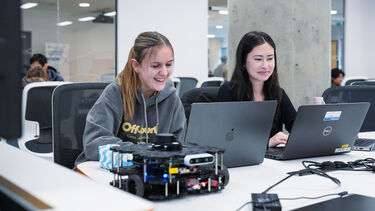Computer Science (Software Engineering) MEng
Our four year degrees are a one year extension to our BSc degrees which allows further specialisation. You will gain industrial experience and engage with real customers when you join Genesys, our student led software development organisation. In your fourth year you will learn about agile software engineering practices and make use of tools used in industry.
-
A Levels
A*AA; AAA -
UCAS code
G650 -
Duration
4 years -
Start date
September
- Accredited
- Course fee
- Funding available
- Optional placement year
- Study abroad
Explore this course:
Course description
Why study this course?
We emphasise the importance of practical skills development, allowing you to gain hands-on experience in designing, building, and testing software systems. This includes opportunities for real-world projects. With these experiences, you'll be immersed in the processes of engineering a real software system for a real client in a competitive environment.
Get hands-on practical experience through our Genesys module. Support real customers to solve genuine problems, using agile software engineering and lean startup practice ÔÇô preparing you for an exciting and varied career.
Our lecturers are renowned computer scientists and internationally recognised researchers whose research shapes our cutting-edge teaching. You'll have access to the latest software and equipment, including high-spec computers with graphics processing units, as well as a robotics arena in our dedicated labs.
Professional, communication and presentation skills help to create more employable computer scientists and software engineers. These are extremely valuable to companies, making you a well-rounded and highly prized candidate.
It's possible to transfer between our courses. This provides an opportunity to understand which areas of computer science spark your interest and add flexibility to your education.
Our dedicated student welfare advisor can provide support, for example, if you are feeling down, overwhelmed or struggling to adjust to student life.

Ignite your interest by learning the art of engineering complex software systems, and how to apply that knowledge to this ever-expanding industry.
Our Computer Science (Software Engineering) MEng programme is a great choice for students who are passionate about software engineering and want to develop the skills to design, build, and test software systems. During your degree, you will have the chance to be hands-on, including supporting real clients by developing innovative solutions.
This course will give you a solid foundation in the fundamentals of software engineering, as well the opportunity to explore different areas of computer science. These include artificial intelligence, cybersecurity, and robotics. Also, you will be able to expand your knowledge in your final year, whilst gaining valuable real word context and transform theory to application.
This course has a strong focus on professional skills to ensure you are well equipped for a career after graduating. You will develop your communication skills and be able to think critically, whilst analysing the impact of your work in a real-world context. These are essential for a career in industry or research, and demonstrate the well-rounded education our programme will provide you.
Throughout your degree, you will use industry standard tools and engineering software systems for real clients. For example, in your final year, you will continue with advanced software engineering themes including Verification and Testing to Computer Security and Forensics, and you will participate in Genesys ÔÇô our student-led software development organisation - solving customersÔÇÖ problems, using agile software engineering and lean startup practice
This course is accredited by the British Computer Society (BCS). It fully meets the requirements for Chartered Information Technology Professional (CITP) and Chartered Engineer (CEng).
Modules
UCAS code: G650
Years: 2026
Core modules:
- Introduction to Software Engineering
-
This module will introduce students to the principles of software engineering, discussing the software lifecycle and approaches to effective teamwork. Students will be introduced to a development framework, which they will work on individually,  and then will apply the principles of software engineering, working in a team to develop a software project.
20 credits - Foundations of Computer Science
-
In the first semester of this module, we will cover the topics in discrete mathematics that provide an essential foundation for later studies in the department. This includes topics such as sets, functions, sequences and relations, propositional and predicate logic, boolean algebra, combinatorics, induction, recursion, proof strategies, and graph theory.
20 credits
In the second semester of this module, we will cover the topics in continuous mathematics that provide an essential foundation for later studies in the department. This includes topics such as trigonometric,  exponential and logarithmic functions, polynomials, limits and continuity, differential calculus of one and two variables, integration, series summation and power series, matrices, vector calculus and linear algebra. - Java Programming
-
This module is about programming in the Java language.
20 credits
There is no requirement that students arrive with any knowledge of programming although many do and some are already very experienced programmers.  This module is intended to ensure that both absolute beginners and strong programmers are capable of writing clear, well structured, readable programs in Java by the end of the module.  
The module is largely taught through practical classes but students will have the opportunity to pace their own learning based on their prior experience.  It does mean that beginners will have to work harder than students who arrive as experts, though some students who consider themselves to be experts may have some unlearning to do - Practical Algorithms and Data Structures
-
This module will introduce students to algorithms and data structures. This module will reinforce the programming concepts that were taught in the autumn semester's programming module while exploring essential data structures and algorithms. This includes a particular focus on algorithms used in traditional AI. Students will also learn to analyse the efficiency of algorithms and data structures, and make informed choices about these for practical problems.
20 credits - Systems and Networks
-
In this module we investigate topics surrounding the function and operation of modern devices, from the foundations of digital logic and number systems, through to an overview of operating systems and their function and the different types of computer networks and associated protocols (including  IP addressing, ethernet fundamentals, switching technologies, router operations supporting small-to-medium business networks,  wireless local area networks (WLAN), and key security concepts).
20 credits - Introduction to Artificial Intelligence and First Year Reflection
-
This module will explore intelligence, what it is, how we might measure it, and how we can learn from natural intelligence, in humans and animals, to create new forms of artificial intelligence (AI) for machines. 
20 credits
A key theme will be to examine similarities and differences between brains and computers, and particularly, the idea that both are able to act intelligently by performing computation.  Through lectures, seminars and computer-based lab classes, the module will investigate some of the key computational building blocks of intelligent systems, including perception and reasoning,  as found in nature and explored through AI. The module will also explore some of the real-world, societal and ethical implications of recent developments in AI and robotics.
Alongside this introduction to artificial intelligence, a parallel thread will support the development of academic and professional skills including the appropriate and ethical use of AI in scholarship and in the workplace. This stream will include reflection upon the content of first year, the skills that have been developed, and their relevance to future study and careers. This includes consideration of why the School believes every one of our undergraduate students should have solid foundations in artificial intelligence, software engineering and the theoretical underpinnings of Computer Science.
Core modules:
- Programming Language Principles
-
On entering this module you will already have a good understanding of object oriented programming from your first year studies. In this module, you will be introduced to further paradigms and programming languages. You will explore the choices that are taken in language design and the relationship between high level language and machine-level code that can be directly executed. In this module you will also look at the particular issues associated with concurrent or parallel programming, and the techniques used to combat them.
20 credits - Cybersecurity in Action and Professional Issues
-
This module has two components. In the first, it aims to teach students about the key security features needed in today's computer systems, how these features can be attacked, and the ways to prevent such attacks. It covers security in a variety of settings, focusing on important topics that are usually taught in the first two years of Computer Science courses, but also looks at some unique aspects of security.
20 credits
We use a practical, hands-on approach to learning about security, similar to what's known as 'Capture the Flag' (CTF) exercises.
The goal is to develop not only technically proficient but also ethically responsible professionals, who are aware of the consequences of their actions on individuals, organisations, and society at large, thereby preparing them to be conscientious and ethical leaders in the cybersecurity field.
The second component looks more widely at the professional issues in the computing discipline, particularly the commercial context and relevant legal matters. - Databases and Logic in Computer Science
-
This module introduces the foundations of databases and logic in computer science. You will cover theoretical underpinnings including  the syntax and semantics of propositional and predicate logics, natural deduction, notions such as soundness, completeness and (un)decidability, normalisation theory of databases, relational algebra and relational calculus. You will also study practical applications of both databases and logic. This will include the use of SQL, including from within other programming languages, and practical applications of formal logic, such as automated reasoning and procedures, and the use of logic for formal verification of computer systems).
20 credits - Software Hut
-
The Software Hut (a microcosm of a real Software House) gives students an opportunity to experience the processes of engineering a real software system for a real client in a competitive environment. The taught element covers the tools and technologies needed to manage software development projects successfully and to deliver software products that meet both client expectations and quality standards. Topics that are put into practice include: the requirements engineering process; software modelling and testing; using specific software development framework(s); group project management; quality assurance; testing. Tutorials take the form of project meetings, and so are concerned with team management, conduct of meetings and action minutes.
20 credits - Automata, Computation and Complexity
-
This module introduces the theoretical foundations for computing systems: finite state machines, pushdown automata, and Turing machines, along with the formal languages that can be recognised by these machine models.
20 credits
It also deals with the question 'What is computable?' and 'What is efficiently computable?' by showing when problems are computationally hard, and how to find algorithmic solutions to computationally hard problems. - Foundations and Applications of Artificial Intelligence
-
This module will provide the mathematical and statistical underpinnings for artificial intelligence, some of which are used more widely in computer science, and look at some practical applications of AI, with a focus on data science.
20 credits
Semester 1 will focus on the mathematical and statistical underpinnings, including probability, random variables and distributions (both discrete and continuous), finite sample spaces, Bayes rule, sampling, hypothesis testing, the law of large numbers, the central limit theorem and linear regression.
Semester 2 will provide an introduction to practical data science. Topics include: data preprocessing, feature extraction, feature selection, and supervised/unsupervised learning. The module will employ a practical Python-based approach to help students develop an intuitive grasp of the sophisticated mathematical ideas that underpin this challenging but fascinating subject.
Core modules:
You'll complete a Dissertation Project. You'll also undertake a 20-credit Advanced Software Engineering module.
- Dissertation Project
-
In the individual research project, you will complete a major original piece of software design, or an experimental investigation. This work will be reported formally in a research dissertation and also presented at a project presentation session, to which industrial representatives, students and academics are invited. The work will include an Interim report that consists of an initial survey and literature review. You will be engaged in a major piece of software development, or the design and execution of an empirical experiment. You will have regular meetings with your supervisor, who will advise on any problems you encounter. You will prepare an 7,000-14,000 word dissertation, which includes the material from the interim report, but also contains a complete design, implementation and evaluation of the results of your project. This may be assessed by oral examination. 
40 credits
Optional modules:
You'll be able to further tailor your degree through a range of relevant optional modules in areas aligned with the SchoolÔÇÖs research interests, including speech and language technologies, healthcare technologies, bioinspired machine intelligence, dependable and secure systems, and mathematical foundations.
Core modules:
- Genesys
-
This module involves students working with real customers and solving genuine problems, using agile software engineering and lean startup practices. Students work in teams to develop web applications as part of Genesys, supported by staff from epiGenesys.
45 credits - Parallel Computing with Graphical Processing Units (GPUs)
-
Accelerator architectures are discrete processing units which supplement a base processor with the objective of providing advanced performance at lower energy cost. Performance is gained by a design which favours a high number of parallel compute cores at the expense of imposing significant software challenges. This module looks at accelerated computing from multi-core central processing units (CPUs) to graphics processing unit (GPU) accelerators with many TFlops of theoretical performance. The module will give insight into how to write high performance code with specific emphasis on GPU programming with NVIDIA CUDA GPUs. A key aspect of the module will be understanding what the implications of program code are on the underlying hardware so that it can be optimised.
15 credits
Optional modules:
You'll be able to further tailor your degree through a range of relevant optional modules in areas aligned with the SchoolÔÇÖs research interests, including speech and language technologies, healthcare technologies, bioinspired machine intelligence, dependable and secure systems, and mathematical foundations.
The content of our courses is reviewed annually to make sure it's up-to-date and relevant. Individual modules are occasionally updated or withdrawn. This is in response to discoveries through our world-leading research; funding changes; professional accreditation requirements; student or employer feedback; outcomes of reviews; and variations in staff or student numbers. In the event of any change we will inform students and take reasonable steps to minimise disruption.
Learning and assessment
Learning
Learning will be delivered through a combination of lectures, practical sessions, tutorials and seminars. You will also learn important group work skills and will have the opportunity to work with clients to solve real-world problems.
As well as formal teaching you will be expected to undertake independent study.
At the end of your third year you will submit a written dissertation and present your findings during a poster session. Your dissertation project could be supervised by one of our research staff or an external supervisor from industry.
Our courses are designed to challenge you and prepare you for a career in industry, research, or teaching.
Our inspirational staff are experts in their fields of research. 99% of our research is rated in the highest two categories in the Research Excellence Framework (REF 2021), meaning it is classed as world-leading or internationally excellent.
Assessment
You will be assessed using a mixture of exams/tests, coursework and practical sessions.
Entry requirements
With Access ¥┼╔½╩ËãÁ, you could qualify for additional consideration or an alternative offer - find out if you're eligible.
The A Level entry requirements for this course are:
A*AA; AAA
A*AA, including Maths; AAA, including Maths and Computer Science
- A Levels + a fourth Level 3 qualification
- AAA, including Maths + A in a relevant EPQ; AAB, including A in Maths and B in Computer Science + A in a relevant EPQ; AAA, including Maths + A in AS or B in A Level Further Maths; AAB, including A in Maths and B in Computer Science + A in AS or B in A Level Further Maths
- International Baccalaureate
- 38, with 6 in Higher Level Maths; 36, with 6 in Higher Level Maths and Computer Science; 36, with 6 in Higher Level Maths, and A in a computer science-based extended essay; 34, with 6 in Higher Level Maths and 5 in Higher Level Computer Science and A in a computer science-based extended essay
- BTEC Extended Diploma
- D*DD in Engineering, Applied Science (including Biomedical Science, Analytical & Forensic Science and Physical Science streams), IT or Computing + A in A Level Maths
- BTEC Diploma
- D*D in Engineering, Applied Science, IT or Computing + A in A Level Maths
- T Level
- Distinction in the Digital Production, Design and Development T Level, including grade A in the core component + A in A Level Maths
- Scottish Highers + Advanced Higher/s
- AAAAA + A in Maths; AAABB + AA in Maths and Computing Science
- Welsh Baccalaureate + 2 A Levels
- A + A*A, including Maths; A + AA in Maths and Computer Science
- Access to HE Diploma
- Award of the Access to HE Diploma in a relevant subject, with 45 credits at Level 3, including 42 at Distinction (to include 18 credits in Maths) and 3 at Merit
The A Level entry requirements for this course are:
AAB; ABB
AAB, including A in Maths; ABB, including A in Maths and B in Computer Science
- A Levels + a fourth Level 3 qualification
- AAA, including Maths + A in a relevant EPQ; AAB, including A in Maths and B in Computer Science + A in a relevant EPQ; AAA, including Maths + A in AS or B in A Level Further Maths; AAB, including A in Maths and B in Computer Science + A in AS or B in A Level Further Maths
- International Baccalaureate
- 34, with 6 in Higher Level Maths; 33, with 6 in Higher Level Maths and 5 in Higher Level Computer Science
- BTEC Extended Diploma
- DDD in Engineering, Applied Science (including Biomedical Science, Analytical & Forensic Science and Physical Science streams), IT or Computing + B in A Level Maths
- BTEC Diploma
- DD in Engineering, Applied Science, IT or Computing + B in A Level Maths
- T Level
- Distinction in the Digital Production, Design and Development T Level, including grade A in the core component + A in A Level Maths
- Scottish Highers + Advanced Higher/s
- AAABB + A in Maths; AABBB + AB, including A in Maths and B in Computing Science
- Welsh Baccalaureate + 2 A Levels
- B + AA, including Maths; B + AB, including A in Maths and B in Computer Science
- Access to HE Diploma
- Award of the Access to HE Diploma in a relevant subject, with 45 credits at Level 3, including 36 at Distinction (to include 18 credits in Maths) and 9 at Merit
You must demonstrate that your English is good enough for you to successfully complete your course. For this course we require: GCSE English Language at grade 4/C; IELTS grade of 6.5 with a minimum of 6.0 in each component; or an alternative acceptable English language qualification
Equivalent English language qualifications
Visa and immigration requirements
Other qualifications | UK and EU/international
If you have any questions about entry requirements, please contact the school/department.
Graduate careers
School of Computer Science
Some of our graduates have gone on to become IT consultants, software engineers, software developers, project managers, and data scientists in companies such as Amazon, ARM, BT, Bank of America & BofA Securities, Goldman Sachs, Google, IBM, Microsoft, and Plusnet. Others have begun their research careers by starting a PhD.
School of Computer Science
National Student Survey (NSS) 2024
The Times and Sunday Times Good University Guide 2025
Research Excellence Framework 2021

Here in ¥┼╔½╩ËãÁ our world-class research is advancing our understanding of computer science, and leading to practical applications that are enhancing peopleÔÇÖs lives. From cutting-edge artificial intelligence that could transform dementia treatment, to text engineering methods that fight the spread of disinformation online, our research is delivering tremendous impact.
Many of our lecturers are leading computer scientists with international reputations, and their research shapes and inspires what you will be taught. This means that what we teach you at ¥┼╔½╩ËãÁ is right up to date. Also, through a research-led education we hope to inspire a sense of creativity and curiosity that will set you on a life-long path of learning and discovery.
As well as our first-class teaching, the hands-on practical skills and industry experience youÔÇÖll gain in ¥┼╔½╩ËãÁ will pave the way for an exciting career. Every year our students go on to work for some of the biggest and most innovative companies in the world.
We teach using industry-standard tools so that you can hit the ground running, and we also help you to develop the problem solving and communication skills that employers really value. We also prepare you for making decisions that will affect others: itÔÇÖs crucial that as a computer science professional you understand the ethical implications of your work and are mindful of its environmental impact.
Our school is a vibrant, diverse and supportive community of like-minded people. If you decide to join us at ¥┼╔½╩ËãÁ, youÔÇÖll be welcomed as part of that community and presented with a multitude of opportunities for extracurricular activities. That is why studying in our school is an excellent investment in your future, whatever path you choose.
Your lectures, practical classes, tutorials and seminars are usually held on the University campus. The Diamond is a world-class building, home to all engineering undergraduates and where most of your practical sessions will take place. Our investment of £81m in the building and £20m for lab equipment is helping us to develop innovative teaching and learning experiences.
Dedicated teaching staff will support you and assist your development into a computer scientist of the future. We regularly host guest lectures from industry, with recent guests including Microsoft, Google, GitHub, IBM and ARM.
Facilities
We use a multitude of cutting edge hardware in our teaching. We have MiRo robots and Robotis turtlebots which are used to teach robotics and programming. These are also used in third year dissertation projects.
We have facilities and equipment exclusively for software development on mobile devices including phones and tablets.
As a computer science student within the Faculty of Engineering, you will have access to specialist facilities in our state-of-the-art hub, The Diamond. Here you will have access to the latest hardware, software and operating systems in our dedicated computer labs. Virtual Reality facilities, high-spec graphics PCs, a robot arena, media editing suites and video and podcast recording studios are all available.
Take one of our MComp or MEng degrees and you will have the opportunity to work in Genesys Solutions, the first student-run software development organisation in the UK, where you will pitch, develop and market ideas for a startup company.
University rankings
A world top-100 university
QS World University Rankings 2026 (92nd) and Times Higher Education World University Rankings 2025 (98th)
Number one in the Russell Group
National Student Survey 2024 (based on aggregate responses)
92 per cent of our research is rated as world-leading or internationally excellent
Research Excellence Framework 2021
University of the Year and best for Student Life
Whatuni Student Choice Awards 2024
Number one Students' Union in the UK
Whatuni Student Choice Awards 2024, 2023, 2022, 2020, 2019, 2018, 2017
Number one for Students' Union
StudentCrowd 2024 University Awards
A top 20 university targeted by employers
The Graduate Market in 2024, High Fliers report
Student profiles
Fees and funding
Fees
Additional costs
The annual fee for your course includes a number of items in addition to your tuition. If an item or activity is classed as a compulsory element for your course, it will normally be included in your tuition fee. There are also other costs which you may need to consider.
Funding your study
Depending on your circumstances, you may qualify for a bursary, scholarship or loan to help fund your study and enhance your learning experience.
Use our Student Funding Calculator to work out what youÔÇÖre eligible for.
Placements and study abroad
Placement
Study abroad
Visit
University open days
We host five open days each year, usually in June, July, September, October and November. You can talk to staff and students, tour the campus and see inside the accommodation.
Subject tasters
If youÔÇÖre considering your post-16 options, our interactive subject tasters are for you. There are a wide range of subjects to choose from and you can attend sessions online or on campus.
Offer holder days
If you've received an offer to study with us, we'll invite you to one of our offer holder days, which take place between February and April. These open days have a strong school focus and give you the chance to really explore student life here, even if you've visited us before.
Campus tours
Our weekly guided tours show you what ¥┼╔½╩ËãÁ has to offer - both on campus and beyond. You can extend your visit with tours of our city, accommodation or sport facilities.
Apply
The awarding body for this course is the University of ¥┼╔½╩ËãÁ.
Recognition of professional qualifications: from 1 January 2021, in order to have any UK professional qualifications recognised for work in an EU country across a number of regulated and other professions you need to apply to the host country for recognition. Read and the .
Any supervisors and research areas listed are indicative and may change before the start of the course.




